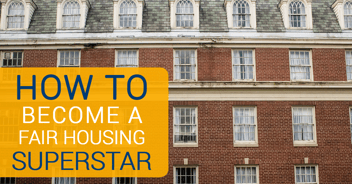4 tips for being a fair housing superstar (part 1)

Next month is Fair Housing Month! In honor of this occasion, I’m sharing four tips I’ve learned over the years. From “senior buildings” and reasonable accommodation to service animals and housing terminology, I’m here to get you on the path to becoming the fair housing superstar I know you are. This is a four part series, so be on the lookout for part two coming out next week!
In Public Housing, There’s No Such Thing as a “Senior Building”
In the public housing program, there are four types of developments.
General Population
These developments are for anyone that meets the eligibility requirements. These are often called “family developments.”
Mixed Population
These developments are reserved for families where the head, spouse or cohead are either elderly (62 and up), or who have a HUD-defined disability.
Designated Disabled
These developments are reserved for families where the head, spouse, or co-head has a HUD-defined disability.
Designated Elderly
These developments are reserved for families where the head, spouse, or co-head is elderly.
The common issue is that many PHAs confuse the phrase “elderly families” with “elderly people.” 24 CFR 945.105 defines an elderly family as follows:
Elderly family means a family whose head, spouse, or sole member is an elderly person. The term “elderly family” includes an elderly person, two or more elderly persons living together, and one or more elderly persons living with one or more persons who are determined to be essential to the care or well-being of the elderly person or persons. An elderly family may include elderly persons with disabilities and other family members who are not elderly (emphasis mine).
This makes it clear that there are no public housing buildings which can legally exclude children. There are many reasons why this confusion occurs. First, many of these mixed population or designated elderly developments contain only studio or one-bedroom units. It can seem odd to public housing staff to allow an elderly head of household to share a one-bedroom unit with a minor child. But the Fair Housing Act prohibits familial status discrimination. This means that a PHA cannot treat families with children differently than families without them. If you would let an elderly couple share a one-bedroom, you must allow an elderly head of household to share a one-bedroom with a minor child as well.
It is also possible that no non-elderly person has ever tried to reside in that development. The community at large, the PHA staff, and the residents have all always just assumed that the development is for "seniors only." It is very common in class for PH staff to refer to these as "senior developments" although that is not a HUD term (more about this linguistic confusion later).
Lastly, many PHA staff, both in property and program management, began their careers in the private housing market, where senior-only housing is legal. And it’s not always immediately clear just how different HUD-funded housing is from private market housing.
What is critically important to understand, however, is that any families on the public housing waitlist who have a head, spouse, or cohead that is elderly must be considered an "elderly family" regardless of any minor children who may also be listed on the application. Failure to offer a unit in a mixed population or designated elderly development to such a family simply because of the presence of minors would be a violation of the Fair Housing Act and a contradiction of 24 CFR 945.105.
Finally, all specially designated developments (mixed population, designated elderly, and designated disabled) must be included in a PHA’s annual contributions contract.
Next: Understand What Reasonable Accommodation Is (and Is Not)
Want to build up your fair housing knowledge?
More about the author:

Adam Ensalaco specializes in making rent calculation easier to understand and clearing up common misconceptions about the process. Adam has previous experience in the affordable housing industry working to house people with disabilities and training housing authorities on reasonable accommodations and has been a part of the NMA team for nearly a decade.




